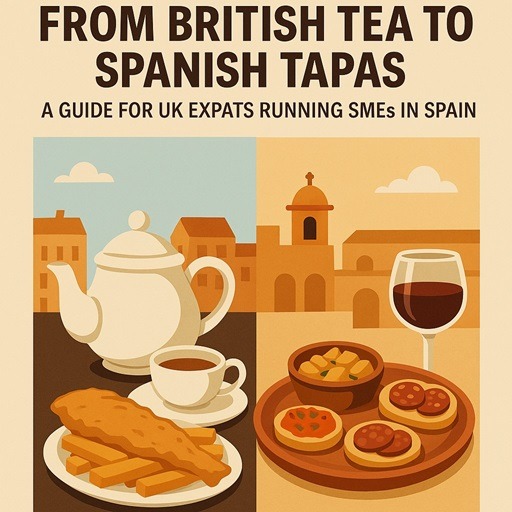Spanish SEO for British Expats: Meta Tags & Local Tips
British expat running an SME in Spain? Learn with JJSEO how to optimise meta titles, descriptions & image tags for Spanish customers with real-world examples.
MULTILINGUAL SEO
Jorge Jaroslavsky
6/17/20255 min read


SEO Localisation: From British Tea to Spanish Tapas - A Guide for UK Expats Running SMEs in Spain
Picture this: You've packed up your life in Manchester, traded grey skies for Spanish sunshine, and opened that dream restaurant on the Costa del Sol. Your fish and chips are legendary among fellow Brits, but your website isn't reaching the locals who might fancy a proper Sunday roast. Sound familiar?
As someone who's helped dozens of British expats navigate the digital landscape in Spain, I've seen this story play out countless times. The difference between thriving and merely surviving often comes down to one crucial factor: how well you speak to Spanish customers in their own digital language.
SEO localisation isn't just about running your English content through Google Translate and calling it a day. It's about understanding how María from Valencia searches differently than Mike from Yorkshire, and crafting your online presence accordingly.
Why Your Current Approach Might Be Falling Flat
Let's be honest – most expat businesses I encounter make the same mistakes. They either stick to English (limiting themselves to tourists and fellow expats) or they translate literally without considering how Spanish speakers actually search online.
Take Sarah, who runs a successful estate agency in Marbella. Her English meta title "Luxury Property Sales on Costa del Sol" performed brilliantly for international buyers, but bombed with Spanish locals. Why? Because Spaniards don't search for "property sales" – they search for "inmobiliaria" or "venta de pisos."
The Art of Meta Titles: Your Digital Shop Window
Your meta title is like your shop window – it determines whether someone walks in or keeps scrolling. With Google showing roughly 50-60 characters, every word counts, especially when Spanish tends to be more verbose than English.
Real Estate Reality Check
Let's revisit Sarah's estate agency. Her original approach:
English: "Buy Coastal Villas in Spain – Expert Estate Agents" (49 characters)
Google Translate attempt: "Comprar Villas Costeras en España – Agentes Expertos" (51 characters)
But here's what actually works:
Localised Spanish: "Villas en la Costa Española – Inmobiliaria Experta" (49 characters)
The magic is in the details. Spanish property seekers search for "inmobiliaria Costa" about 12,000 times monthly. By leading with "inmobiliaria" instead of the more literal "agentes," Sarah tapped into established search patterns.
Teaching English, Spanish Style
James teaches English in Alicante and struggled with local student acquisition until we tweaked his approach:
Original: "English Lessons for All Levels in Alicante" (41 characters)
Improved: "Clases de Inglés en Alicante – Todos los Niveles" (47 characters)
Notice how I moved "en Alicante" forward? That's because Spanish searchers often include location early in their queries. "Clases de inglés Alicante" has significantly higher search volume than other variations.
Meta Descriptions: Where Personality Meets Performance
Meta descriptions are your elevator pitch – you've got 155-160 characters to convince someone your business is worth clicking. This is where cultural nuances really shine through.
The Taste of Home Dilemma
Tom's British pub in Benalmádena initially used:
English: "Enjoy authentic British cuisine at our Costa del Sol restaurant. Book now for a taste of home!" (88 characters)
The direct translation felt stiff and foreign:
Translation: "Disfruta de la auténtica cocina británica en nuestro restaurante de Costa del Sol. ¡Reserva ya!"
Instead, we created something that speaks to Spanish sensibilities:
Localised: "Saborea platos británicos en nuestro restaurante en Costa del Sol. ¡Reserva tu mesa hoy!" (84 characters)
"Saborea" (savour) appeals to Spanish food culture's emphasis on sensory experience. "Reserva tu mesa" (book your table) sounds more natural than the abrupt "Reserva ya" (book now).
Adventure Calls in Spanish
Lisa runs adventure tours in Andalusia and learned that Spanish tourists respond differently to adventure marketing:
Original: "Guided tours of Andalusia's hidden gems. Book your adventure with our expert guides!" (81 characters)
Improved: "Descubre Andalucía con tours guiados por expertos. ¡Reserva tu experiencia única hoy!" (83 characters)
"Descubre" (discover) taps into the Spanish love of exploration, while "experiencia única" (unique experience) appeals to their desire for authentic, personalised adventures. "Tours Andalucía" alone gets 15,000 monthly searches.
Image Alt Tags: The Unsung Heroes of Local SEO
Alt tags might seem like an afterthought, but they're gold mines for local SEO. Spanish screen readers and search engines need to understand your images in context.
Financial Services with a Human Touch
David, a financial advisor in Madrid, initially used generic descriptions:
English: "British financial advisor meeting clients in Madrid office"
Better Spanish: "Asesor financiero en Madrid atendiendo a clientes en su oficina"
By dropping "británico" (British) and using "atendiendo" (serving/attending), David's images began appearing in searches for "asesor financiero Madrid" – 8,000 monthly searches and counting.
Food Photography That Sells
Restaurant owners often struggle with food image descriptions. Instead of:
Literal: "Asado de domingo servido en restaurante británico en Marbella"
Try this approach:
Appetising: "Plato de asado dominical en restaurante de Marbella"
This focuses on the dish rather than the nationality, appealing to anyone craving a Sunday roast experience.
Cultural Considerations That Make or Break Campaigns
Spanish digital culture has its own rhythm. Direct, enthusiastic language works better than British understatement. "¡Reserva tu experiencia!" creates more urgency than a polite "Book now, please."
Regional pride runs deep in Spain. Mentioning specific areas like "Costa del Sol," "Valencia," or "Cataluña" in your meta content increases local relevance dramatically. I've seen SEO localisation strategies triple local engagement simply by embracing regional identity.
Don't forget practical details: use euros (€) and metric measurements. Spanish users expect "desde 500€" not "from £400."
Technical Foundations That Support Success
Behind every successful localisation effort are solid technical foundations:
Hreflang Implementation: Signal to Google which language version serves which audience. Use <link rel="alternate" hreflang="es-es" href="https://example.com/es/"> for Spanish users.
URL Structure: Subfolders (example.com/es/) work better than subdomains for most SMEs, maintaining domain authority while providing clear language separation.
Keyword Research Tools: Ahrefs and KWFinder reveal search volume differences. "Estate agent" might work in Birmingham, but "inmobiliaria" rules in Barcelona.
Mobile Optimisation: With 70% of Spanish searches happening on mobile, and online penetration reaching 96.4%, ensure your localised content loads quickly and displays properly on smartphones.
Industry-Specific Strategies for Common Expat Businesses
Different professions require different approaches:
Real Estate: Focus on property types and locations. "Apartamentos Costa Blanca" or "chalets Valencia" often outperform generic terms.
Hospitality: Blend authenticity with familiarity. "Té de la tarde británico" or "fish and chips auténtico" work well.
Education: Emphasise personalisation and results. "Clases de inglés personalizadas" appeals to Spanish parents' preference for tailored education.
Tourism: Highlight unique experiences and local knowledge. "Tours privados Granada" or "excursiones personalizadas Sevilla" capture intent effectively.
Measuring Success and Iterating Forward
Track your progress through Google Analytics (organic traffic from Spain), Search Console (Spanish keyword performance), and A/B test different approaches. What works in Madrid might need tweaking for Barcelona.
Remember, successful SEO localisation isn't about perfect translation – it's about perfect communication. When you understand how your Spanish customers think, search, and decide, your digital marketing efforts become exponentially more effective.
Your Spanish adventure doesn't have to be limited to personal fulfilment. With thoughtful SEO localisation, your business can thrive in both languages, serving tourists who crave a taste of home and locals curious about British culture. The key is speaking to each audience in their preferred digital dialect.
Ready to transform your online presence for the Spanish market? Start with one page, test the results, and expand from there with JJSEO. Contact me today! Your future Spanish customers are already searching – make sure they can find you.
Expertise
Driving organic traffic with tailored SEO solutions.
Growth
Results
Mail to: jj@jjseo.co.uk
© 2025 JJSEO. All rights reserved. | Expert SEO Consultant in Leeds
